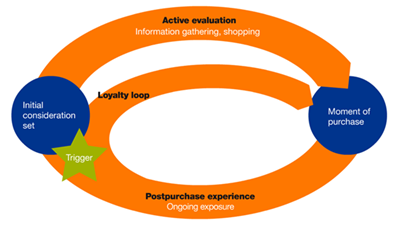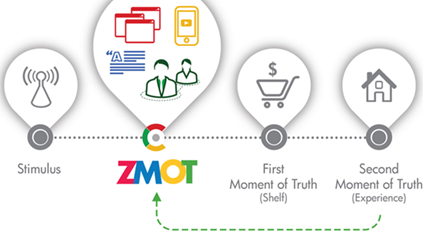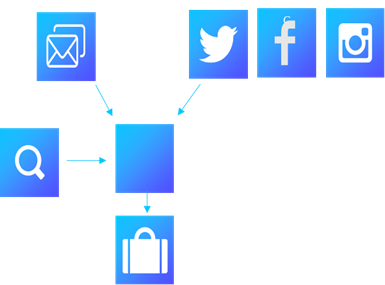Why use a Marketing Strategy?
Don’t waste your money. In this blog I am going to outline why a marketing strategy can save you money in the long run and create a stronger return on investment.
Why do you need a marketing strategy?
There are several different marketing strategies and models available to use. You can see a couple of examples shown below:
The McKinsey Consumer Decision Making Journey

The Zero Moment of Truth Study from Google

What most of these models now show is that the decision to buy a product, certainly one of any significant value starts long before we make our purchase. In fact research in 2018 shows that 82% of smartphone users will consult their phones for in-store purchases.
What do these models tell us about marketing? It tells us that we need different messages for different stages of the buying process and that we need to have our marketing in a variety of places to be seen. In the 1930’s the long held rule of 7 was constructed, and it states that a consumer needs to see your message seven times before they will purchase. In today’s digital world you probably need seven messages just to be seen above the crowd and they need to be in different places to be seen.
What should businesses do to be seen?
Businesses need a marketing strategy. A lot of businesses approach their marketing with a scatter gun approach, they will place an advert in a local magazine when they see a good deal, or they will sponsor a local junior sports team. But when they do this, they don’t use a strategy and the messaging changes for each tactic and nothing is joined up. This means that the consumer or purchaser for a B2B customer doesn’t connect the different tactics together, and if they are done as separate entities then the tactics fail to generate any interest or awareness.
At this point many businesses will be getting worried about the costs that a number of tactics may require, but it doesn’t have to, with a sensible application of time it doesn’t have to break the bank, and if it is integrated and planned out, will lead to a return on investment, rather than your marketing being a cost. An example of this can be seen in the diagram below. The diagram shows three social media channels, email and Google search all pushing the users to their website. The website then pushes the prospect to a meeting. So how much would all this cost? the truth is not that much.
The Zero Moment of Truth Study from Google

But isn’t pay per click expensive? On top of these two strategies, there is also the option to offer Pay Per Click, this means that when people search for your products of services on Google you will be found. The key to any good strategy is planning. So, before each month starts, decide what products/ services you want to focus on and what topics you want to discuss online. You then make a content calendar and arrange what messages are going out that month on social media and then make sure that those messages are backed up by email. You can then use platforms like Hootsuite, (which does have a free option) to schedule your social media and platforms like MailChimp to create your email campaigns and landing pages if required. Both are low cost options of spreading your message.
It doesn’t have to be, but unless you know what you are doing I would suggest using an agency or a freelancer that knows that they are doing to manage your account. I work with a company that offers £250 media spend for only £75 a month management fee, so depending on your budget, you don’t need to break the bank. Google also often gives out offers for free ad spend or matched ad spend so make sure that you keep an eye out for those offers.
The key thing though when implementing your strategy is maintaining the integrated approach. The tone of voice and messaging on your social media, should match with your PPC, your email campaign and the messages on your website. As your prospects and customers go around the internet they should be able to recognize the messaging as coming from your business.
The examples of tactics so far in this blog have focused on digital media but the same strategy needs to be maintained across all of your channels, whether they are sponsorships, adverts, direct mail or PR.
A final tip:
I spoke about using social media to promote your messages, to make your posts stand out, I recommend the design platform Canva. It is really easy to do and has the dimensions for each social media platform built in.
Blog by GW - The Marketing Guy
Join Our FREE Business Owners Hub
Get access to our latest blogs, PDF downloads and updates.




